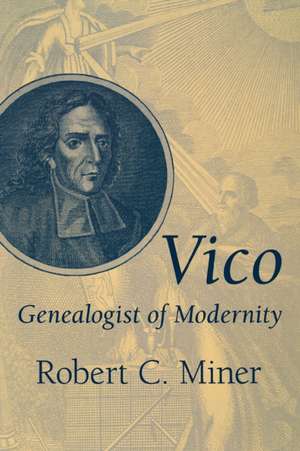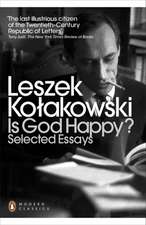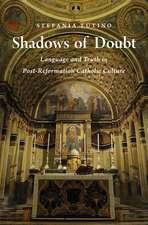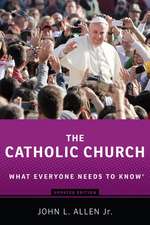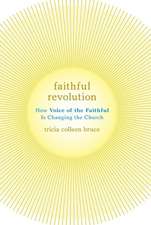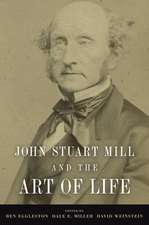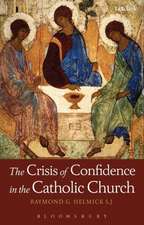Vico, Genealogist of Modernity
Autor Robert C. Mineren Limba Engleză Hardback – 23 iul 2002
In this lucid and probing study, Robert C. Miner argues that Giambattista Vico (1668–1744) was the architect of a subversive, genealogical approach to modernity. Miner documents the genesis of Vico’s stance toward modernity in the first phase of his thought. Through close examination of his early writings, centering on Vico’s critique of Descartes and his elaboration of the ‘verum-factum’ principle, Vico, Genealogist of Modernity reveals that Vico strives to acknowledge the technical advances of modernity while unmasking its origins in human pride.
Miner’s careful analysis of the often neglected Universal Law shows how Vico uses Augustine to articulate a new conception of natural law that mediates between the idealism of Plato and Aristotle and the realism of Tacitus and Machiavelli. Vico emerges as a penetrating reader of traditional philosophy and philology, as well as a radical pioneer of modern historical consciousness.
Miner also traces important connections between Vico’s magnum opus, the New Science, and his earlier writings, arguing that the New Science is not merely a work of scientific history. Miner contends that this work is more fundamentally a genealogy that enacts Nietzsche’s desire to treat etymology and language as signposts for understanding the development of moral concepts. Miner shows how Vico’s genealogy attempts to disclose hidden continuities between the culture of secular modernity and the pagan institutions of idolatry, divination, and sacrifice.
Throughout this engaging work, Miner portrays Vico’s genealogy as expressly Augustinian and Catholic, yet sufficiently complex to resist assimilation to reactionary anti-modernism. According to Miner, the goal of Vico’s genealogy is to encompass the best of ancient and medieval traditions within an “encyclopedic” fusion of history and philosophy that is both modern and Christian. Although Vico sees the “age of man” as moving toward the “barbarism of reflection,” his trust in divine providence saves him from nihilistic despair. Miner concludes that Vico’s thought not only anticipates later efforts to infuse philosophy with historical consciousness, but also contains the seeds of a coherent alternative to the program of postmodern genealogy.
Miner’s careful analysis of the often neglected Universal Law shows how Vico uses Augustine to articulate a new conception of natural law that mediates between the idealism of Plato and Aristotle and the realism of Tacitus and Machiavelli. Vico emerges as a penetrating reader of traditional philosophy and philology, as well as a radical pioneer of modern historical consciousness.
Miner also traces important connections between Vico’s magnum opus, the New Science, and his earlier writings, arguing that the New Science is not merely a work of scientific history. Miner contends that this work is more fundamentally a genealogy that enacts Nietzsche’s desire to treat etymology and language as signposts for understanding the development of moral concepts. Miner shows how Vico’s genealogy attempts to disclose hidden continuities between the culture of secular modernity and the pagan institutions of idolatry, divination, and sacrifice.
Throughout this engaging work, Miner portrays Vico’s genealogy as expressly Augustinian and Catholic, yet sufficiently complex to resist assimilation to reactionary anti-modernism. According to Miner, the goal of Vico’s genealogy is to encompass the best of ancient and medieval traditions within an “encyclopedic” fusion of history and philosophy that is both modern and Christian. Although Vico sees the “age of man” as moving toward the “barbarism of reflection,” his trust in divine providence saves him from nihilistic despair. Miner concludes that Vico’s thought not only anticipates later efforts to infuse philosophy with historical consciousness, but also contains the seeds of a coherent alternative to the program of postmodern genealogy.
| Toate formatele și edițiile | Preț | Express |
|---|---|---|
| Paperback (1) | 227.48 lei 6-8 săpt. | |
| MR – University of Notre Dame Press – 30 iul 2017 | 227.48 lei 6-8 săpt. | |
| Hardback (1) | 589.10 lei 6-8 săpt. | |
| MR – University of Notre Dame Press – 23 iul 2002 | 589.10 lei 6-8 săpt. |
Preț: 589.10 lei
Preț vechi: 765.06 lei
-23% Nou
Puncte Express: 884
Preț estimativ în valută:
112.72€ • 118.01$ • 93.27£
112.72€ • 118.01$ • 93.27£
Carte tipărită la comandă
Livrare economică 05-19 aprilie
Preluare comenzi: 021 569.72.76
Specificații
ISBN-13: 9780268034689
ISBN-10: 0268034680
Pagini: 232
Dimensiuni: 161 x 240 x 22 mm
Greutate: 0.52 kg
Ediția:1
Editura: MR – University of Notre Dame Press
ISBN-10: 0268034680
Pagini: 232
Dimensiuni: 161 x 240 x 22 mm
Greutate: 0.52 kg
Ediția:1
Editura: MR – University of Notre Dame Press
Recenzii
“[M]any novel and positive insights. . . . Chief of these is the way he incorporates Vico's Catholicism into his analysis of Vico's thought. He is really the first Vico scholar to try this kind of synthesis in a systematic way. ... he deserves great credit for calling attention to the New Science, and Vico's thinking as a whole, as an important episode in the study of the history of ethics and religion.” —New Vico Studies
“Miner contends that reading Vico to understand his critique of secular modernity is the key to discovering him. His text is rich in probing questions and comparisons. . . . His style is clear and interesting and ends with helpful notes, bibliography, and index.” —Choice
"Miner’s book rests on a thorough knowledge of Vico’s work. . . . [It] offers original insight and understanding into a seminal, if occasionally neglected, figure and is therefore highly recommended.” —Library Journal
Textul de pe ultima copertă
“Miner has produced something very remarkable—a short, clear account of Vico’s writings based upon a comprehensive knowledge of all the crucial texts. Vico, Genealogist of Modernity does not shirk Vico’s difficulties, and yet it comes to clear conclusions which I think help us at last to make sense of what Vico is really saying. It establishes beyond doubt that Vico was not a secular skeptic, but an Orthodox Catholic thinker, who nonetheless re-expressed this Orthodoxy in a fashion so radical that it outflanked the radicalism of the Enlightenment. This book is a winner.” —John Milbank, Frances Myers Ball Professor of Philosophical Theology, University of Virginia
“In this erudite, sharply written book, Robert Miner passionately argues that Vico’s thought represents a radical alternative to the dominant paradigms about modernity, which are steadily shadowed by nihilism, are blinded by scholarly and self-centered conceits, and wander in their own discontents. By rigorous and close textual readings, Miner’s analysis focuses on the two major works by Vico: the Diritto universale and the New Science, and in both texts he finds a compelling case for a philosophy born not of pride but of humility. In the poetic-rational account Miner weaves, Vico's philosophy, which is articulated in the wake of Christian and classical traditions of thought, is capable of questioning modernity's scientific self-delusions. It also enables us to reflect on the future of humanity as it unveils the historical and providential design of our culture.” —Giuseppe Mazzotta, Charles C. and Dorathea S. Dilley Professor of Italian Language and Literature, Yale University and author of The New Map of the World: The Poetic Philosophy of Giambattista Vico
“In this erudite, sharply written book, Robert Miner passionately argues that Vico’s thought represents a radical alternative to the dominant paradigms about modernity, which are steadily shadowed by nihilism, are blinded by scholarly and self-centered conceits, and wander in their own discontents. By rigorous and close textual readings, Miner’s analysis focuses on the two major works by Vico: the Diritto universale and the New Science, and in both texts he finds a compelling case for a philosophy born not of pride but of humility. In the poetic-rational account Miner weaves, Vico's philosophy, which is articulated in the wake of Christian and classical traditions of thought, is capable of questioning modernity's scientific self-delusions. It also enables us to reflect on the future of humanity as it unveils the historical and providential design of our culture.” —Giuseppe Mazzotta, Charles C. and Dorathea S. Dilley Professor of Italian Language and Literature, Yale University and author of The New Map of the World: The Poetic Philosophy of Giambattista Vico
Notă biografică
Robert C. Miner is professor of philosophy at Boston College.
Descriere
Descriere de la o altă ediție sau format:
In this lucid and probing study, Robert C. Miner argues that Giambattista Vico (1668-1744) was the architect of a subversive, genealogical approach to modernity. Through close examination of his early writings, this book reveals that Vico strives to acknowledge the technical advances of modernity while unmasking its origins in human pride.
In this lucid and probing study, Robert C. Miner argues that Giambattista Vico (1668-1744) was the architect of a subversive, genealogical approach to modernity. Through close examination of his early writings, this book reveals that Vico strives to acknowledge the technical advances of modernity while unmasking its origins in human pride.
